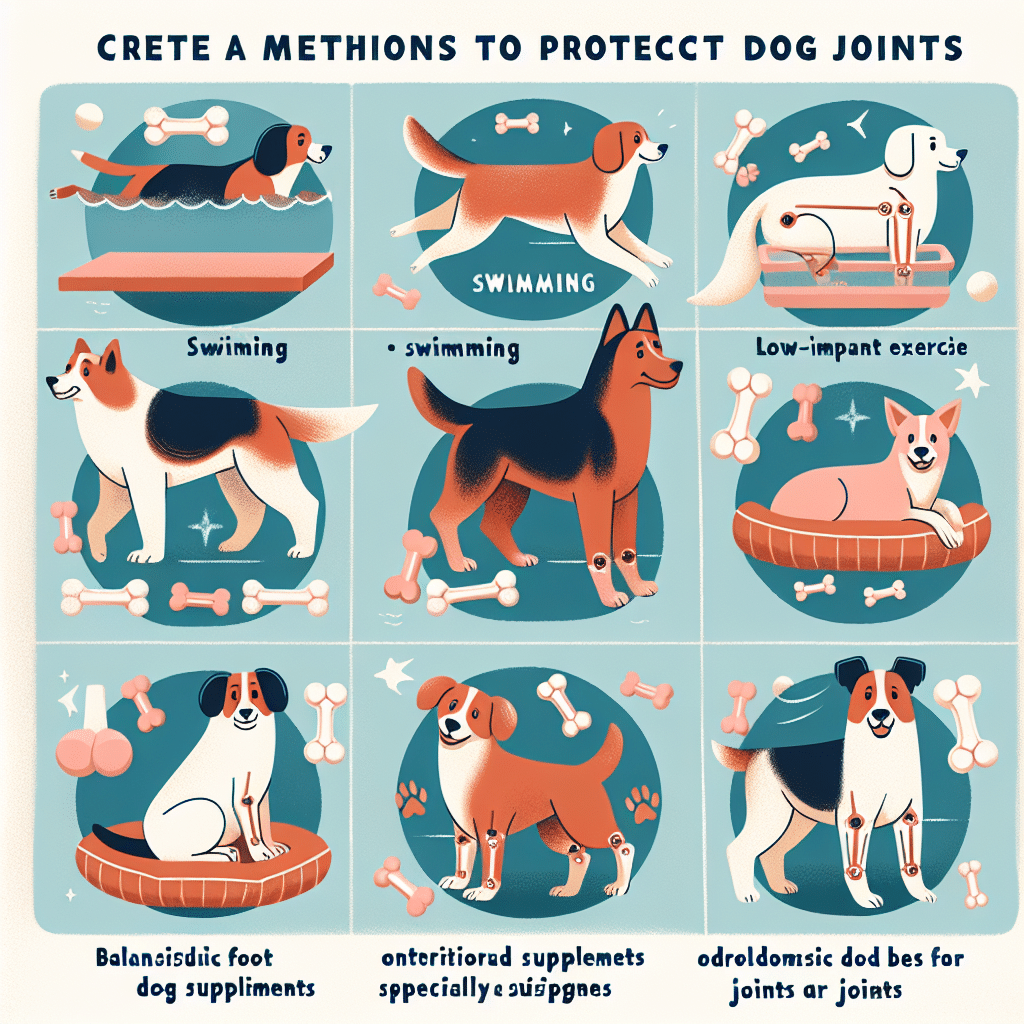How to protect dog joints
-
Table of Contents
Protecting your dog’s joints is essential for ensuring their long-term health and mobility. Joint issues, such as arthritis and hip dysplasia, can significantly impact a dog’s quality of life, causing pain and limiting their ability to move comfortably. To safeguard your dog’s joints, it is important to focus on several key areas: maintaining a healthy weight, providing a balanced diet rich in joint-supporting nutrients, ensuring regular but appropriate exercise, and considering supplements or medications as recommended by a veterinarian. Additionally, creating a safe and comfortable living environment, including the use of orthopedic beds and non-slip surfaces, can help prevent injuries and reduce strain on your dog’s joints. By taking these proactive steps, you can help your dog enjoy a more active and pain-free life.
Best Supplements For Dog Joint Health
Ensuring the longevity and health of a dog’s joints is a crucial aspect of responsible pet ownership. As dogs age, their joints can become susceptible to wear and tear, leading to discomfort and mobility issues. To mitigate these problems, incorporating the right supplements into a dog’s diet can play a significant role. Among the most effective supplements for dog joint health are glucosamine, chondroitin, omega-3 fatty acids, and MSM (methylsulfonylmethane). Each of these supplements offers unique benefits that contribute to maintaining and improving joint health.
Glucosamine is a naturally occurring compound found in cartilage, the tissue that cushions joints. It is often recommended for dogs suffering from arthritis or other joint-related issues. Glucosamine supplements help to rebuild cartilage and maintain joint fluid, which is essential for smooth and pain-free movement. By providing the building blocks for cartilage repair, glucosamine can significantly reduce inflammation and improve joint function over time. It is commonly available in various forms, including tablets, capsules, and liquid supplements, making it easy to incorporate into a dog’s diet.
In conjunction with glucosamine, chondroitin is another vital supplement for joint health. Chondroitin works by inhibiting the enzymes that break down cartilage, thereby preserving the integrity of the joint structure. This supplement also helps to retain water in the cartilage, ensuring that it remains elastic and resilient. When used together, glucosamine and chondroitin create a synergistic effect that enhances their individual benefits, providing comprehensive support for joint health. Many veterinarians recommend a combination of these two supplements for dogs experiencing joint pain or stiffness.
Omega-3 fatty acids, commonly found in fish oil, are renowned for their anti-inflammatory properties. These essential fatty acids can help reduce joint inflammation and pain, making them particularly beneficial for dogs with arthritis. Omega-3 fatty acids also support overall health by promoting a healthy coat, improving cardiovascular function, and boosting the immune system. Including omega-3 supplements in a dog’s diet can provide a holistic approach to managing joint health while offering additional health benefits.
MSM, or methylsulfonylmethane, is another supplement that can be highly effective in supporting joint health. MSM is a natural sulfur compound that plays a crucial role in the formation of collagen, which is essential for maintaining the structural integrity of joints. It also possesses anti-inflammatory properties, which can help alleviate pain and swelling associated with joint issues. By promoting collagen production and reducing inflammation, MSM can contribute to improved joint flexibility and overall mobility.
While these supplements can offer significant benefits, it is essential to consult with a veterinarian before introducing any new supplement into a dog’s diet. A veterinarian can provide personalized recommendations based on the dog’s specific needs, age, weight, and health condition. Additionally, it is important to ensure that the supplements are of high quality and sourced from reputable manufacturers to guarantee their efficacy and safety.
In conclusion, protecting a dog’s joints is a multifaceted approach that includes proper nutrition, regular exercise, and the right supplements. Glucosamine, chondroitin, omega-3 fatty acids, and MSM are among the best supplements for promoting joint health in dogs. By incorporating these supplements into a dog’s diet, pet owners can help ensure their furry companions maintain healthy joints, enjoy a higher quality of life, and remain active well into their senior years.
Effective Exercises To Strengthen Dog Joints

When it comes to maintaining the health and longevity of our canine companions, one of the most critical aspects to consider is the well-being of their joints. Effective exercises play a pivotal role in strengthening dog joints, thereby preventing common issues such as arthritis and hip dysplasia. To begin with, it is essential to understand that not all exercises are created equal. Low-impact activities are particularly beneficial for dogs, as they minimize stress on the joints while promoting muscle strength and flexibility.
Swimming is an excellent example of a low-impact exercise that can significantly benefit a dog’s joints. The buoyancy of water reduces the weight-bearing load on the joints, allowing dogs to move freely without causing undue stress. Additionally, swimming helps to build muscle mass, which in turn supports and stabilizes the joints. For dogs that are new to swimming, it is advisable to start with short sessions and gradually increase the duration as they become more comfortable in the water.
Another effective exercise is walking, which is both simple and highly beneficial. Regular walks help to maintain a healthy weight, reducing the strain on a dog’s joints. It is important to choose even surfaces for walking, as uneven terrain can exacerbate joint issues. Moreover, incorporating varied walking routes can provide mental stimulation, which is equally important for a dog’s overall well-being. For older dogs or those with existing joint problems, shorter and more frequent walks are recommended to prevent overexertion.
In addition to walking and swimming, controlled play activities can also contribute to joint health. Fetch, for instance, can be modified to suit dogs with joint concerns. Instead of throwing the ball long distances, which can lead to sudden stops and turns that stress the joints, opt for gentle tosses that encourage a steady pace. Similarly, tug-of-war can be a joint-friendly game if played on a soft surface and with controlled movements.
Strength training exercises are another valuable component of a joint health regimen. Simple activities such as sit-to-stand exercises can help to build the muscles around the joints, providing better support and reducing the risk of injury. To perform this exercise, encourage your dog to sit and then stand up repeatedly, using treats as motivation if necessary. This not only strengthens the muscles but also improves joint flexibility.
Furthermore, balance and coordination exercises can enhance joint stability. Using tools like balance boards or wobble cushions, dogs can engage in activities that challenge their proprioception, or sense of body position. These exercises require the dog to make small, controlled movements, which can help to strengthen the stabilizing muscles around the joints.
It is also crucial to incorporate rest and recovery into any exercise routine. Overworking a dog’s joints can lead to inflammation and injury, negating the benefits of exercise. Ensuring that your dog has a comfortable place to rest and recover is just as important as the exercise itself.
In conclusion, a well-rounded exercise regimen that includes low-impact activities, strength training, and balance exercises can significantly contribute to the health and strength of a dog’s joints. By carefully selecting and modifying exercises to suit your dog’s individual needs, you can help to ensure their joints remain healthy and functional throughout their life.
Dietary Tips For Maintaining Healthy Dog Joints
Maintaining healthy joints in dogs is crucial for their overall well-being and longevity. One of the most effective ways to support joint health is through a well-balanced diet. Proper nutrition can help prevent joint issues and alleviate symptoms in dogs already experiencing joint discomfort. To begin with, incorporating high-quality protein sources into your dog’s diet is essential. Proteins are the building blocks of muscles and tissues, including those around the joints. Lean meats such as chicken, turkey, and fish provide the necessary amino acids that support muscle maintenance and repair, which in turn helps stabilize and protect the joints.
In addition to proteins, omega-3 fatty acids play a significant role in maintaining joint health. These essential fats have anti-inflammatory properties that can reduce joint pain and stiffness. Fish oil supplements or foods rich in omega-3s, such as salmon and flaxseed, can be beneficial. Including these in your dog’s diet can help manage inflammation and improve mobility. Furthermore, antioxidants are vital for combating oxidative stress, which can damage joint tissues over time. Vitamins C and E, found in fruits and vegetables like blueberries, spinach, and sweet potatoes, can help neutralize free radicals and support overall joint health.
Another important dietary consideration is maintaining an appropriate weight for your dog. Excess weight puts additional strain on the joints, exacerbating any existing issues and potentially leading to new problems. Feeding your dog a balanced diet with controlled portions can help manage their weight effectively. Additionally, incorporating fiber-rich foods such as pumpkin and green beans can aid in digestion and promote a feeling of fullness, reducing the likelihood of overeating.
Glucosamine and chondroitin are two supplements that have gained popularity for their joint-supporting properties. Glucosamine helps in the formation and repair of cartilage, while chondroitin prevents the breakdown of cartilage and promotes water retention in the joint tissues. These supplements can be found in various forms, including tablets, chews, and powders, and can be added to your dog’s diet to support joint health. However, it is advisable to consult with a veterinarian before introducing any new supplements to ensure they are appropriate for your dog’s specific needs.
Moreover, hydration is often overlooked but is crucial for joint health. Adequate water intake helps maintain the lubrication of joints, facilitating smoother movement and reducing friction. Ensuring your dog has access to fresh water at all times is a simple yet effective way to support their joint health.
Lastly, it is important to avoid foods that can exacerbate joint issues. Processed foods, high in unhealthy fats and sugars, can contribute to inflammation and weight gain, both of which are detrimental to joint health. Opting for natural, whole foods and avoiding artificial additives can make a significant difference in your dog’s overall health and joint function.
In conclusion, a well-rounded diet rich in high-quality proteins, omega-3 fatty acids, antioxidants, and essential supplements can play a pivotal role in maintaining healthy dog joints. Coupled with proper hydration and weight management, these dietary tips can help ensure your dog enjoys a long, active, and pain-free life. Always consult with a veterinarian to tailor a diet plan that best suits your dog’s individual needs and conditions.





![The Dog Podcast Uncovers Startling Truths About What We Feed Our Dogs [Press Release]](https://knowledgenook.com.au/wp-content/uploads/2024/08/dog-with-nutritious-food-400x280.jpg)



